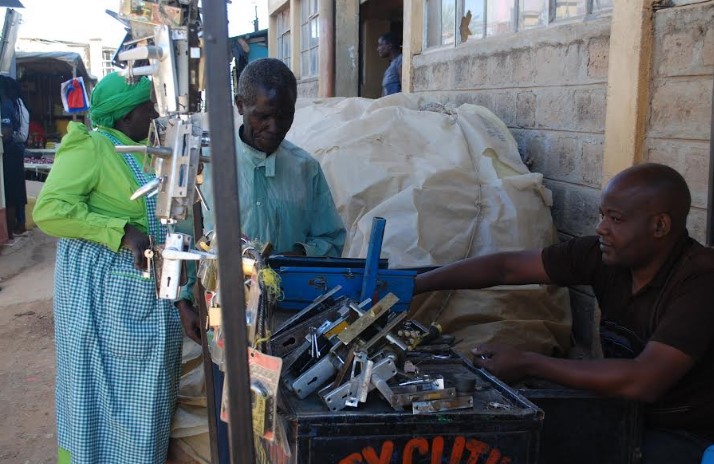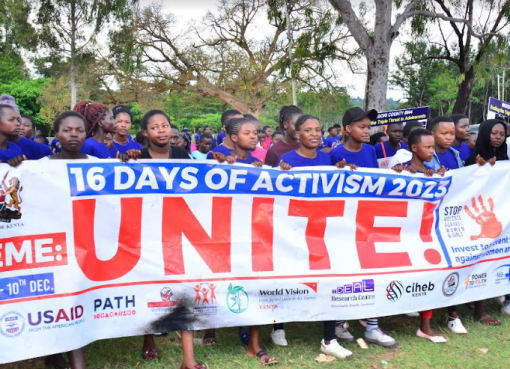At the southern end of the entrance to the Kakamega market sits one Caleb Amateshe, a well-known locksmith.
Armed with his toolbox, the 41-year-old locksmith, despite being disabled following a road accident six years ago, goes about his work effortlessly as he attends to his clientele.
Customers contract Amateshe to fix new locks in new buildings or to replace old ones with new sets of locks.
Amateshe is also an expert in all kinds of vehicle ignitions, a technique that has made him carve a niche in the market.
He buys old locks and padlocks from scrap metal dealers, repairs and sells them at much cheaper prices as compared to new ones bought from the hardware shops.
“Some of these old locks are far better than the new ones acquired from the shops in terms of security matters,” says the father of three children from Kisa in Khwisero sub-county in Kakamega.
He did not finish his KCSE education at Namasoli Secondary School, where he dropped out only two years shy of sitting for his Kenya Certificate of Secondary Education (KCSE) due to lack of school fees in the year 1995. But this has not deterred the spirit in him to work hard.
He then traveled to Nairobi in 1997 in search of employment and his first stop was at Kawangware.
“I started selling roasted green maize and kales (Sukuma-wiki) in order to make a living,” he says.
“I would go to the Toy market near Kibera in Nairobi to buy the green maize and Sukuma-Wiki and transport them to Kawangware, where I operated a stall,” he adds.
He said he ran the business for a year before changing to “mitumba shoes (second-hand shoes)” at the famous Gikomba market.
“Second-hand female shoes was a booming business at Gikomba but did not last long. One of the reasons was getting stock at the right time or even not getting any, which negatively affected my business for the 18 years I was in the business,” he says.
“I remember there were times when I could not get any stock for my business to run and this did not help my business at all,” he admits.
Despite the challenges, Amateshe says another opportunity came his way when he opened a hardware shop at Donholm along the Outering Road in Nairobi to run simultaneously with the “mitumba shoes” business.
“I operated the hardware for five years but the business collapsed after the owner of the premises he operated from sold it after realizing a road was to be opened through the plot. This forced him to now concentrate on the Gikomba business.
But a turn of events suddenly changed his life permanently when he was traveling home from Nairobi about six years ago.
The bus he was traveling in together with other passengers was involved in an accident that left him with a broken leg.
But this accident didn’t dampen Amateshe’s spirit. After recovering, he continued to work hard and managed to put up a four-room permanent house for his family of five members that is connected to the electricity.
“I also operate a posho mill at Kisa and I’m currently constructing a six-room house for my father,” he adds.
“None of my children, two boys and a daughter, want to be a locksmith like me; instead, they aspire to be doctors if all goes on well,” he says.
“From the work of my hands, I’ve been able to pay school fees for my three sisters and my younger brother Geoffrey Amwila, who scored a C+ last year at Shivinga Secondary and is waiting to join university,” he adds.
Amateshe is also paying fees for his sister Phyllis Amunza, who is currently training to be a nurse at the Kenya Medical Training College. His other two sisters are yet to join college education.
Amateshe looks forward to a bright future. He plans to buy a plot that is near a highway and establish a hardware shop but only if he gets about Sh2 million to add to what he has set aside.
“I have experience in the hardware business. I have mentored many friends into the business and many are rich. All you have to do is buy your goods from “Mhindi mmoja” (buy from a particular Indian) who will supply you with goods on credit. But you must be honest and pay him back on a weekly basis,” he said.
He is also banking his hopes on the expansion of the Standard Gauge Railway (SGR) from Naivasha to Malaba on the Kenya-Uganda border.
“The SGR is earmarked to pass through our ancestral land at his Bushibungwa village, Ikomero Sub-location in East Kisa in Khwisero Constituency,” he adds.
He says already that the government has asked the affected landowners to procure land title deeds so that they could be compensated adequately once the reconstruction of the line commences.
“My father already has his land title deed,” he adds. Amateshe plans to use some of the compensation money to finish some of his projects.
By Albert Muteshi




